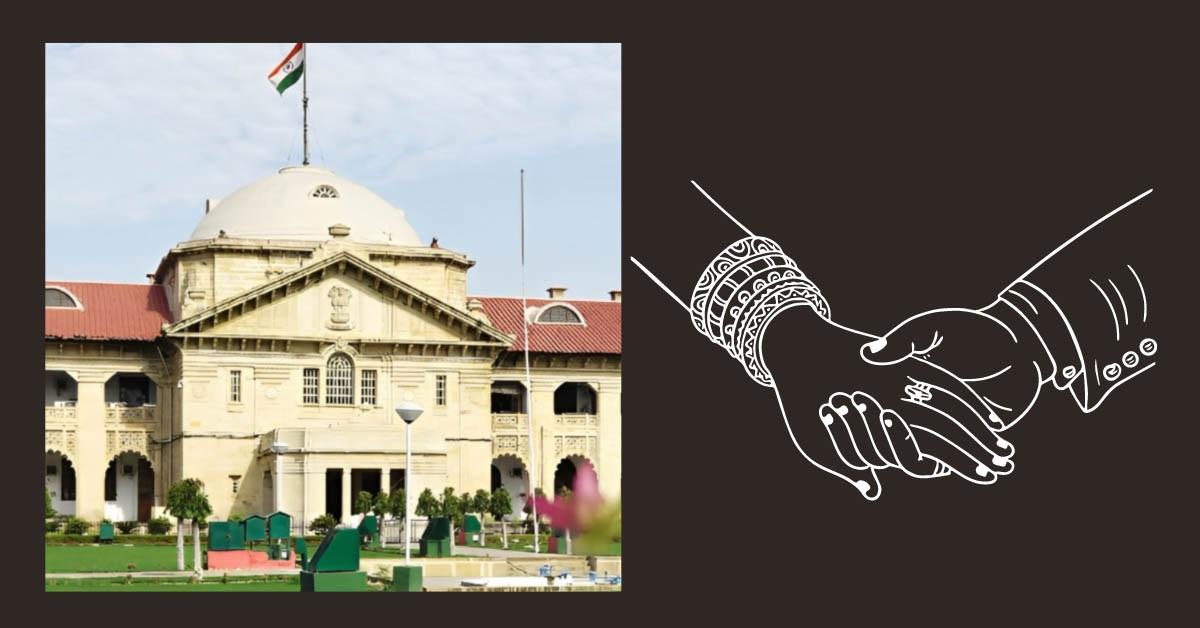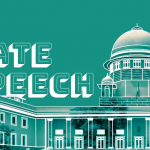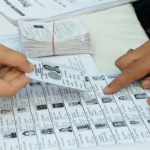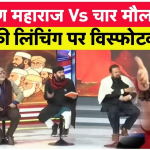
Allahabad High Court stands firm on personal liberty interfaith marriage ruling Landmark case protects individual liberty, but conflicting judgments leave couples in limbo.
14, Jun 2024 | HASI JAIN
A Division Bench of Justices JJ Munir and Arun Kumar Singh Deshwal on June 7, 2024 observed that that no one can restrain adults from staying with a person of their choice or marrying according to their wishes as such a right flows from Article 21 (right to life and liberty) of the Constitution of India.
In a recent case involving Naziya Ansari and her husband Mohammad Umar brought further attention to the rights of individuals in interfaith marriages. The Allahabad High Court criticised the Uttar Pradesh Police for handing over 21-year-old Naziya to her uncle against her will. Naziya and Umar had filed a petition alleging police misconduct after Naziya claimed she ran away from home and married Umar in Hyderabad. Despite her statement to a magistrate expressing fear for her life if sent back to her uncle, the police disregarded her plea and threatened Umar with arrest.
The court emphasised that adults have the constitutional right to marry and live with whom they choose, protected under Article 21 of the Indian Constitution, which guarantees personal liberty. The court criticized the magistrate for failing to protect Naziya and held the police accountable for not ensuring her safety.
“Even if the petitioners have not married each other, no one can restrain an adult from going anywhere that he/she likes, staying with a person of his/her choice, or solemnizing marriage according to his/her will or wish. This is a right which flows from Article 21 of the Constitution”
The court ordered the quashing of the FIR against Umar, directed that Naziya be allowed to live freely without interference from her uncle, and made it clear that the police officers would be personally responsible if any harm befell her. The court also underscored the importance of protecting human life from honor killings or any form of harm due to societal or familial pressures by stating that the magistrate ought to have also taken adequate measures to secure the woman’s safety.
“Honour killing in such matters is not an unknown phenomenon and it is very important to save a human life from extinction on account of misguided emotions or notions of morality. This issue is quite independent of the issue of matrimony that the parties have entered into. No citizen can kill another for holding a different opinion and it is the foremost duty of the State to preserve human life,”
The order may be read here:
Mixed, conflicting and contentious judgments
While this judgment is indeed a step in the right direction, interfaith couples in India continue to face significant challenges due to conflicting judicial rulings and societal attitudes. The legal landscape is fraught with inconsistencies, which often result in a lack of uniform protection for interfaith couples. For instance, despite the strong stance taken in Naziya Ansari’s case, other judgments have upheld restrictions on interfaith relationships under various state laws, such as the UP Prohibition of Unlawful Conversion of Religion Act, 2021. This act, and similar laws in other states, require couples to follow stringent procedures for religious conversion and marriage, often leading to harassment and legal obstacles. Additionally, some courts have interpreted these laws in ways that effectively criminalize interfaith relationships unless they conform to prescribed legal norms.
These conflicting judgments create a precarious environment for interfaith couples, who find themselves at the mercy of varying legal interpretations and local enforcement practices. For instance, the Allahabad High Court itself has delivered decisions both supporting and restricting interfaith relationships, contributing to an unpredictable legal environment. Such inconsistency not only undermines the rule of law but also exacerbates the social stigma and threats faced by interfaith couples. Despite progressive judgments like that of Naziya Ansari, the struggle for interfaith couples is far from over. They continue to navigate a legal system that can alternately protect or endanger them, depending on the interpretation of the law by individual courts.
In light of this, CJP’s research team will point out some conflicting judgments that highlight the ongoing struggle for consistent legal protection for interfaith couples in India.
Contrasting Judgments by the Allahabad High Court
Justice Renu Agarwal’s rulings exemplify the prioritization of religious and customary laws over constitutional protections. In February 2024, she denied protection to a Muslim woman in a live-in relationship with a Hindu man, ruling that the woman was committing ‘Zina’ and ‘Haram’ according to Shariat Law. This decision underscores how subjective interpretations of personal laws can supersede the constitutional rights guaranteed under Article 21 (right to life and personal liberty) and Article 14 (equality before the law) of the Indian Constitution.
The order can be read here:
In January 2024, the Allahabad High Court dismissed petitions from eight Hindu-Muslim couples based on non-compliance with the Uttar Pradesh Prohibition of Unlawful Conversion of Religion Act, 2021. This act requires prior notice and approval for religious conversion, imposing stringent bureaucratic hurdles for interfaith marriages. The court’s insistence on compliance with these laws further complicates the legal process for couples wishing to marry under their personal beliefs and choices. In Ayesha Parveen’s case, the court dismissed a petition due to non-compliance with the anti-conversion law, despite the couple’s willingness to practice their respective religions post-marriage. In the case of Farah B Kumar v. State of UP, the bench of Justice Saral Srivastava again rejected the protection plea of the interfaith couple filed by one Farha on exactly the same ground as it mentioned in the above judgment. Similarly, in Nagma Bano’s case, the court rejected a petition for protection despite claims of forced remarriage, emphasizing societal norms over individual rights and safety.
A detailed analysis of these petitions can be read at Sabrang India.
The Allahabad High Court’s refusal to grant police protection to interfaith couples has faced significant criticism. These decisions often hinge on non-compliance with anti-conversion laws and the lack of marriage registration proof, leading to a discriminatory practice. Couples from the same religion without marriage certificates often receive protection, while interfaith couples do not. This practice directly contradicts Supreme Court guidelines, as emphasized in Devu G Nair vs State of Kerala, which mandate immediate interim protection for vulnerable couples, including interfaith, inter-caste, and LGBTQ+ couples. The Allahabad High Court’s rulings have been criticised for undermining these constitutional protections and emphasizing social morality over individual rights.
The Allahabad High Court in the case of the Salamat Ansari vs. State of UP case protected an interfaith couple, recognizing their fundamental right to live together, even after the woman had converted to her partner’s religion. This decision relied on Supreme Court judgments that upheld the right to personal liberty and freedom of choice in relationships, highlighting a more progressive approach in protecting interfaith couples’ rights. This judgment overturned Noor Jahan Begum @ Anjali Mishra and Another vs. State of U.P. and Others and Priyanshi @ Km. Shamren and others Vs. State of U.P. and Another which held that, conversion only for the purpose of marriage is invalid.
The Uttar Pradesh Prohibition of Unlawful Conversion of Religion Act, 2021, requires prior notice and approval for conversion, making it difficult for interfaith couples to get married without facing legal and social obstacles. On March 13, the Bench of Justice Mahesh Chandra Tripathi and Gajendra Kumar clarified that the issue was about individual liberty and the right to choose a partner, as guaranteed under Article 21 of the Constitution. The court noted that the petitioners were adults who married of their own free will under the Special Marriage Act, referencing the Salamat Ansari vs. State of UP case, which upheld the right to choose a partner irrespective of religion as part of the fundamental right under Article 21. Additionally, it cited Gian Singh vs. State of Punjab, differentiating between heinous crimes and private disputes, justifying the quashing of the criminal proceeding.
In the case of Razia and Another v. State of U.P. and Others, the court ruled that noted that interfaith couples are free to live together in a live-in relationship, and their parents cannot interfere. However, in the recent case of Shilpa Alias Shikha and Another vs. State Of U.P. Through Principal Secretary Home Department, Lucknow and Others the court held that Section 3(1) of the Uttar Pradesh Prohibition of Unlawful Conversion of Religion Act, 2021 prohibits live-in relationships between couples of different religions unless they undergo religious conversion according to the law. The court highlighted that the UP Prohibition of Unlawful Conversion of Religion Act, 2021, applies not only to marriages but also to relationships resembling marriage or live-in relationships. The court therefore, ruled that the FIR could not be quashed as the couple had not solemnized their marriage in accordance with the law.
Both the orders can be read here:
LiveLaw reported on May 31, 2024 that the Allahabad High Court has emphasized that interfaith couples can marry under the Special Marriage Act (SMA) without the need for religious conversion. In a recent case, the court granted protection to an interfaith live-in couple seeking to marry under the SMA, highlighting the judiciary’s role in safeguarding personal liberty and life choices against societal and familial pressures. The court directed the couple to demonstrate their bona fides by taking steps to solemnize their marriage under SMA and submit documentary proof via a supplementary affidavit.
How this is problematic
The Allahabad High Court’s conflicting judgments regarding interfaith relationships create a problematic and unpredictable legal environment for couples seeking protection of their rights. These inconsistencies not only undermine the constitutional guarantees of personal liberty and equality before the law but also perpetuate discrimination against interfaith couple. Firstly, the court’s denial of protection to interfaith couples in live-in relationships on the grounds of Islamic customary law and non-compliance with anti-conversion laws raises serious concerns. The court in these cases prioritized customary and religious laws over constitutional protections, which is problematic because it allows subjective interpretations of personal laws to supersede fundamental rights guaranteed under the Constitution of India. The insistence on compliance with anti-conversion laws adds an additional layer of legal and bureaucratic hurdles, effectively denying protection to couples who wish to marry under their personal beliefs and choices.
Secondly, the rejection of police protection for interfaith couples based on these interpretations violates their constitutional rights, including Article 21 (right to life and personal liberty) and Article 14 (equality before the law). Previous Supreme Court rulings, such as in Shakti Vahini vs. Union of India and Shafin Jahan vs. Ashokan K.M, uphold the right to marry a person of one’s choice as integral to Article 21. The Allahabad High Court’s decisions often contradict these precedents, prioritizing social morality over constitutional protections. This discriminatory practice provides protection to same-faith couples with marriage certificates while imposing additional hurdles on interfaith couples, exposing them to potential harassment and violence. However, the Allahabad High Court’s decisions contradict these precedents, prioritizing social and religious norms over individual autonomy and constitutional rights.
Moreover, the inconsistency in judicial decisions creates confusion and uncertainty for interfaith couples. Couples face the risk of harassment, intimidation, and violence due to the lack of legal protection and clear guidelines. The pattern of rejection in the Allahabad High Court, especially under judges like Justice Renu Agarwal, who have consistently denied protection to unmarried couples, underscores the bias against interfaith relationships.
The court’s insistence on religious conversion as a prerequisite for protection further exposes couples to privacy violations and threats to their safety. This requirement not only disregards the secular nature of the Indian Constitution but also perpetuates discrimination against minority communities and vulnerable individuals.
Furthermore, these conflicting judgments do not align with Supreme Court guidelines that mandate immediate interim protection for vulnerable couples, including interfaith and inter-caste couples. The Allahabad High Court’s decisions undermine the principles of justice, fairness, and non-discrimination that are fundamental to a democratic society governed by the rule of law.
The way forward: building a bridge of understanding
The battle for legal acceptance of interfaith marriages in India is far from over. However, the path forward is clear. By prioritizing a consistent and rights-based approach, India can move towards a future where love transcends religious boundaries. Here’s what needs to happen:
The Indian judiciary, particularly the Allahabad High Court, must adopt a unified interpretation of laws concerning interfaith relationships. This demands prioritizing fundamental rights enshrined in the Constitution, such as individual liberty and freedom of religion. Courts must move away from subjective interpretations of religious laws that can supersede these fundamental rights.
The constitutionality of anti-conversion laws in several Indian states deserves thorough examination. These laws, often used to harass and intimidate interfaith couples, raise concerns about their compatibility with the secular fabric of the Indian Constitution. A Supreme Court review is essential to ensure these laws don’t infringe on individual rights and the freedom to choose one’s faith.
Clear and unambiguous guidelines for police intervention in interfaith relationship disputes are crucial. Police training programs must emphasize the rights of individuals in interfaith relationships and the importance of upholding the rule of law. This will prevent instances of police bias and ensure the safety of vulnerable couples.
Conclusion
To summarise, the key takeaway is the inconsistency in the court’s decisions. On one hand, the court upholds the constitutional right to marry whomever one chooses. On the other hand, it prioritizes religious laws and anti-conversion legislation, creating hurdles for interfaith couples. This inconsistency exposes couples to legal uncertainty, potential discrimination by law enforcement, and societal pressures.
Moving forward, a unified approach based on fundamental rights enshrined in the Constitution is crucial. The judiciary needs to prioritize individual liberty and freedom of religion. Anti-conversion laws need scrutiny to ensure they don’t infringe on individual rights. Clear police guidelines and social awareness campaigns promoting tolerance are also essential.
The battle for legal acceptance of interfaith marriages in India requires a multi-pronged approach. By prioritizing a consistent, rights-based approach, India can create a future where love transcends religious boundaries.
CJP’S fight against the Anti Conversion Laws
In December 2020, Citizens for Justice and Peace (CJP) filed a Writ Petition in the Supreme Court, challenging the constitutionality of law anti conversion laws which are based on unfounded fears dubbed ‘love-jihad’. These laws violate personal liberty, freedom of choice, privacy, and conscience by restricting inter-faith marriages.
‘Love-jihad’ refers to interfaith marriages where a Muslim man is accused of courting a Hindu woman to convert her to Islam. Ministers from Uttarakhand, Uttar Pradesh, Madhya Pradesh, Himachal Pradesh, Gujarat, and Karnataka publicly vowed to introduce laws against ‘love-jihad’.
CJP’s petition referenced the Supreme Court’s 2018 ruling in Shafin Jahan v. Asokan K.M., affirming the fundamental right to change religion, as well as cases such as KS Puttaswamy v. Union of India (2017), Shakti Vahini v. Union of India (2018), and Indian Young Lawyers Association v. The State of Kerala (2019), which emphasized the importance of privacy, choice, and religious beliefs in upholding dignity.
The petition was heard by a 3-Judge Bench led by Chief Justice S.A. Bobde, along with Justices V. Ramasubramanian and A.S. Bopanna, who issued notices to the concerned states.
Subsequently, Himachal Pradesh (2019) and Madhya Pradesh (2020) enacted Anti-Conversion laws similar to those in Uttarakhand and Uttar Pradesh. In February 2021, CJP applied to include these enactments in their original petition, which was granted by Chief Justice Bobde’s Bench.
On January 16, 2023, a 3-Judge Bench led by Chief Justice D.Y. Chandrachud, with Justices P.S. Narasimha and J.B. Pardiwala, began hearing the petition as it remained pending.
While CJP’s petition is still pending, Gujarat (2021), Haryana (2022), and Karnataka (2022) enacted their own Anti-Conversion laws. However, the Gujarat High Court stayed several sections of the Gujarat Freedom of Religion (Amendment) Act on August 19th, 2021.
Related :
SC issues notice to 5 states in CJP’s renewed challenge to anti-conversion laws










